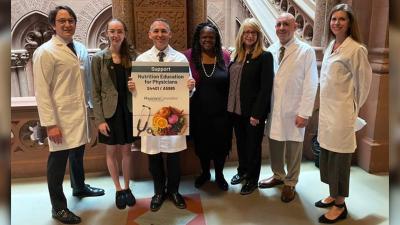Low-Fat Vegan Diet Reduces Insulin Requirements and Improves Insulin Sensitivity for People With Type 1 Diabetes, Finds Groundbreaking New Study

WASHINGTON, D.C.—A low-fat vegan diet rich in fruits, vegetables, grains, and beans reduces insulin needs and improves insulin sensitivity and glycemic control in people with type 1 diabetes, according to a first-of-its-kind study by the Physicians Committee for Responsible Medicine published in Clinical Diabetes. The study also found that a vegan diet led to improvements in cholesterol levels, kidney function, and weight.
Type 1 diabetes is thought to be caused by an autoimmune reaction that destroys the beta cells in the pancreas that make insulin. Insulin is a hormone that helps move glucose (sugar) from the blood into muscle and liver cells to be used as energy. People with type 1 diabetes must take insulin because their body doesn’t produce enough. Some people with type 1 diabetes may also have insulin resistance, which is a condition in which cells don’t respond well to insulin and glucose remains in the blood. Insulin resistance is strongly influenced by dietary fat, which can inhibit glucose from entering the cells. Over time, high blood glucose levels can lead to health complications.
In the 12-week study, which is the first randomized clinical trial to look at a vegan diet in people with type 1 diabetes, 58 adults with type 1 diabetes were randomly assigned to either a low-fat vegan group with no limits on calories or carbohydrates, or a portion-controlled group that reduced daily calorie intake for overweight participants and kept carbohydrate intake stable over time.
Those in the low-fat vegan diet group reduced the amount of insulin they needed to take by 28% and increased insulin sensitivity (how well the body responds to insulin) by 127%, compared with those following the portion-controlled diet. This was associated with changes in body weight. Body weight decreased by about 11 pounds on average in the vegan group, compared with a nonsignificant change in body weight in the portion-controlled group. Changes in insulin sensitivity were also associated with increased carbohydrate and fiber intake. Previous research shows that reducing fat and protein intake is also associated reduced insulin requirements and improved insulin sensitivity in people with type 1 diabetes.
In the vegan group, total cholesterol decreased by 32.3 mg/dL compared to 10.9 mg/dL in the portion-controlled group. LDL cholesterol decreased by approximately 18.6 mg/dL in the vegan group and did not change significantly in the portion-controlled group.
Type 1 diabetes is associated with an increased risk of cardiovascular disease and death. In this study, the reduction in insulin use on the vegan diet corresponds to a 9% reduction in cardiovascular risk; the decrease in HbA1c corresponds to a 12% and 8.8-12% reduced risk of heart attack and cardiovascular disease, respectively; and the reduction in LDL cholesterol corresponds to an approximate 20% reduced risk for a major cardiac event, including heart attack and stroke.
Approximately 40,000 new cases of type 1 diabetes are diagnosed each year. Recent analyses project up to a 107% increase in prevalence of type 1 diabetes by 2040. The annual cost of type 1 diabetes care increased by more than 50% from 2012 and 2016, primarily due to rising costs of insulin and diabetes monitoring equipment.
“With the cost of insulin remaining a concern for many, our groundbreaking research shows that a low-fat vegan diet that doesn’t restrict carbs may be the prescription for reducing insulin needs, managing blood sugar levels, and improving heart health in people with type 1 diabetes,” says Hana Kahleova, MD, PhD, the lead author of the study and director of clinical research at the Physicians Committee for Responsible Medicine.
Media Contact
Michael Keevican
202-527-7367
mkeevican[at]pcrm.org
Founded in 1985, the Physicians Committee for Responsible Medicine is a nonprofit organization that promotes preventive medicine, conducts clinical research, and encourages higher standards for ethics and effectiveness in education and research.







